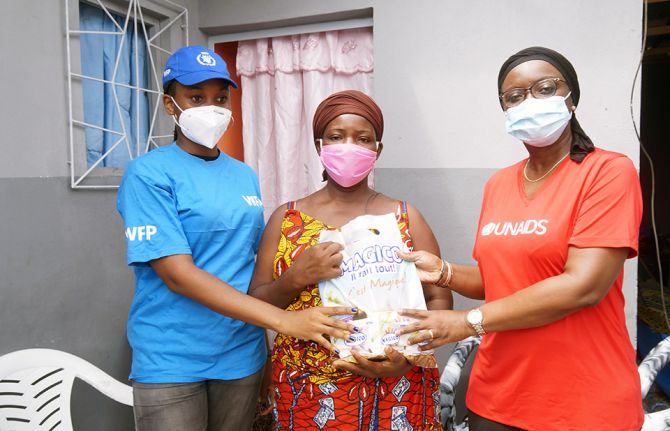

Feature Story
Providing support to COVID-19-hit households in Côte d’Ivoire
01 July 2020
01 July 2020 01 July 2020Thousands of households have been helped in Abidjan, Côte d’Ivoire, through a joint initiative to reach vulnerable households with money for nutrition and food security and basic health kits during the COVID-19 pandemic.
Restrictions on movement imposed to stop the spread of the new coronavirus in Côte d’Ivoire have had a significant impact on the ability of people to earn a living, resulting in an increasing danger of hunger. For people living with HIV, malnutrition and food insecurity reduce HIV treatment adherence, impacting their health and increasing HIV transmission, since stopping treatment can increase a person’s viral load, which increases the chance of passing the virus on. Food insecurity can also increase HIV risk behaviours, potentially putting people at increased risk of acquiring HIV.
The partnership between the World Food Programme, UNAIDS and the Magic System Foundation—a nongovernmental organization that works in the fields of education, health, the environment and culture—allows for a cash transfer of 51 000 central African CFA francs (around US$ 89) per household to cover food needs for two months, distributes hygiene kits and protective equipment to limit the transmission of COVID-19 and gives advice on nutrition.
“The cash transfer allowed me to buy my medicine for three months and to stock up on rice for my family. It gave me the strength to live and smile again,” said one of the recipients.
The priority focus of the campaign are female-headed households and households with pregnant and breastfeeding women, young children, the elderly, people with disabilities and people living with HIV.
“UNAIDS and the Ivorian Network of People Living with HIV are working with various partners—mayors, nongovernmental organizations, the Red Cross, mosques, churches, community leaders, neighbourhood leaders and traditional chiefs—to facilitate access to especially vulnerable people living with HIV,” said Brigitte Quenum, the UNAIDS Country Director for Côte d’Ivoire.
“The health crisis has forced some households to adopt irreversible food strategies, such as selling assets or borrowing money to meet their food needs. Cash-based food aid helps build the resilience of vulnerable households and preserve their livelihoods. The cash transfer provides the opportunity to have a diversified and balanced diet for good health, while leaving recipients with a choice,” said Adeyinka Badejo, the World Food Programme Representative in Côte d’Ivoire.
A further round of assistance for vulnerable households, especially households containing members of key populations or people living with HIV, will take place soon. The second round will draw on a rapid assessment of the needs of people living with HIV during the COVID-19 pandemic, which was carried out by the network of people living with HIV with the support of UNAIDS, and on the lessons learned from the first round of assistance.



